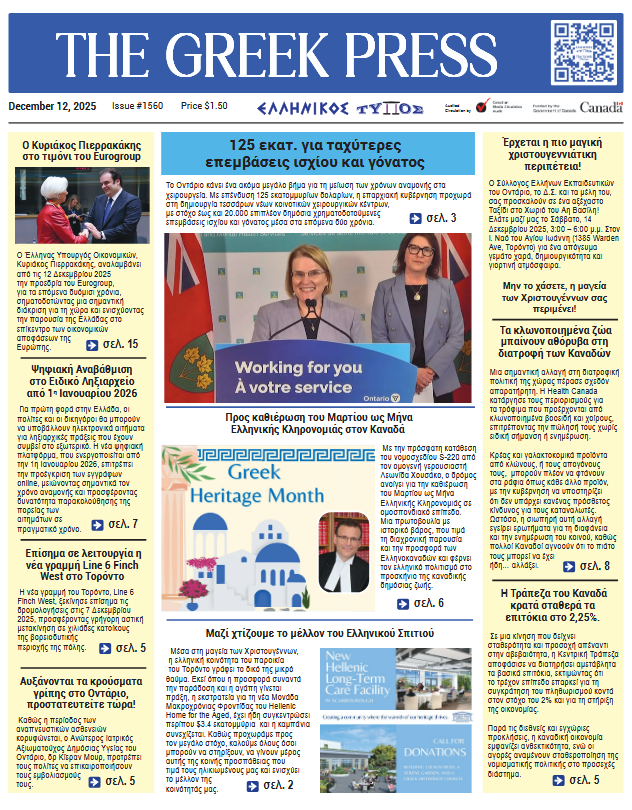 CLICK TO VIEW THE WHOLE PUBLICATION ONLINE
CLICK TO VIEW THE WHOLE PUBLICATION ONLINECanada has been without an embassy in Cyprus since 1970, and is the only G7 country without a diplomatic presence on the island nation
As Cyprus remembers Canada’s peacekeeping past on the island nation, its top diplomat in Ottawa hopes to see Canada reopen its high commission in Nicosia.
Since the outbreak of hostilities over ethnic tensions between the majority Greek Cypriots and minority Turkish Cypriots in the mid-1960s, followed by a Greek-backed coup and the Turkish invasion in 1974, more than 25,000 Canadian troops were deployed to Cyprus between 1964 and 1993. Twenty-eight Canadians were killed during the conflict.
Sitting in his Metcalfe Street office—surrounded by maps highlighting the geostrategic significance of Cyprus, situated in the Mediterranean Sea between mainland Europe and the Middle East—Cypriot High Commissioner Giorgos Ioannides said he wants to see Canada’s historic presence restored.
“It will help immensely the relationship to further grow when Canada re-establishes or reopens its mission, its high commission, in Cyprus,” Ioannides told The Hill Times during a Feb. 7 interview. “This will give a boost to the relationship that is very much in demand by the Cyprus authorities or government.”
Canada is represented in Cyprus by its ambassador to Greece. Ottawa had a resident high commissioner in Nicosia from 1965-1970. It is currently the only G7 country without a full-fledged mission in Cyprus. Canada has embassies and high commissions in more than 100 countries around the world.
“We want Canada to be on the ground to be there 24/7. We want our friends and allies to be there with us, as we are ourselves here [in Ottawa],” Ioannides said.
He cited the possible evacuation of Canadians from Lebanon to Cyprus (as happened in 2006) as one of the benefits of having a diplomatic presence on the ground. Ioannides said that while Canada and Cyprus struck contingency plans for an evacuation if it ever becomes necessary, all other countries that are working with Cyprus on prospective evacuations have missions on the ground.
The Cypriot envoy said that if a rapid response is required, a high commission in Cyprus is needed.
He added that Canada has indicated its interest in participating in a Cyprus-backed, Israeli-approved maritime corridor to provide aid to Gaza.
“Without having a 24/7 permanent presence there is only so much you can do,” he said.
Ioannides said Canada is “not negative” about putting a high commission in Cyprus, but cited budget constraints.
“They don’t say they don’t want to be [in Cyprus],” he said. “It’s more of a budget decision … and to find the right way to start having a physical presence in Cyprus.”
Ioannides said that when Cyprus opened its high commission in Ottawa in 2015, there was an expectation and hope that “sometime down the road there would be reciprocity.”
He said the current moment is the right one to look at Canada increasing its diplomatic presence in Nicosia, with 2024 being the 60th anniversary of the start of the UN peacekeeping mission in Cyprus, as well as 2025 being the 65th anniversary of the start of diplomatic relationships between the two countries.
The Cyprus High Commission is planning a series of commemorative events to mark the peacekeeping milestone.
Ioannides remarked that Canada played a key role defending the Nicosia airport during Turkey’s 1974 invasion.
“The Canadian contingent was responsible for strategic locations in the Nicosia airport, and Canada was one of the few, if not the only country, that … had a robust presence during the Turkish invasion,” he said. “They resisted. There are at least three places where Canada affirmed and reaffirmed its position.”
On March 13—the anniversary of the day in 1964 when the first Canadian peacekeepers arrived in Cyprus—there will be a ceremony and a wreath laying at the Peacekeeping Monument on Sussex Drive, with Veterans Affairs Minister Ginette Petitpas Taylor and Canadian veterans who served in Cyprus.
Ioannides said there will also be a photo exhibition highlighting Canada’s peacekeeping legacy in Cyprus at the Canadian War Museum. He added work is also being done to prepare for local school visits to educate students about the role Canada played in the conflict.
Later this year, a trip is planned for 100-200 Canadian veterans and their families to visit Cyprus and the sites where they served.
“They are very moved when they talk about Cyprus, especially those who were there in ’74,” Ioannides said. “They are very proud—emotional and proud—of what they have achieved.”
Neil Moss - The Hill Times

































